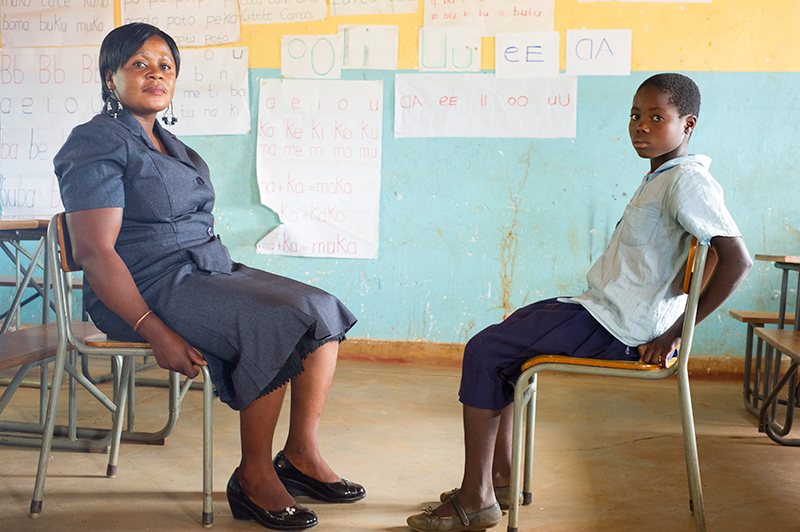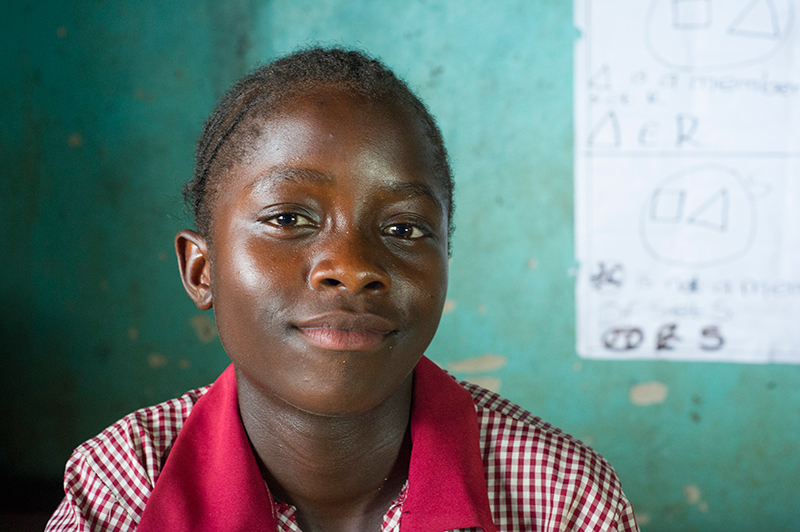Lundazi, ZambiaThe walls of Mankhaka Primary School in the rural outskirts of this small town are plastered with colorful signs displaying vocabulary words, class schedules and school rules. Among these signs in the head teacher’s office is a chart with the names of the school’s 45 learners, out of 441, who have lost one or both parents due to HIV/AIDs, malaria or other causes.
“HIV/AIDS has not spared the district, like any other place in the tropical Africa or in Zambia,” says Herbert Mwiinga, District Education Board Secretary for the Lundazi District, which is in the country’s Eastern Province. “So we have a challenge of a number of vulnerable children that have got no support.”
In Zambia, HIV/AIDS afflicts roughly 12.5 percent of the population and has left more than 670,000 children orphaned, according to UNICEF data from 2012. More than 1.4 million Zambian children are orphans due to HIV/AIDS and other causes combined.
For many of these children, coping with loss, trauma and financial hardship while trying to stay in school can be overwhelming, leading to high rates of dropout and low academic achievement.
As part of Creative Associates International’s “whole learner, whole teacher, whole school approach” to school effectiveness , USAID/Read to Succeed and Zambia’s Ministry of Education, Science, Vocational Training and Early Education (MESVTEE) is reaching these vulnerable students with key psychosocial support to keep them on track for success inside and outside the classroom.
The Read to Succeed project is funded by the U.S. Agency for International Development and implemented by Creative.
“Educating a child is not just giving them skills in arithmetic or English and expect them to learn when they have psychosocial or emotional problems,” says Audrey Mwansa, Deputy Chief of Party and Guidance and Counseling Advisor for USAID/Read to Succeed. “Unless the psychosocial domain is also addressed, the child cannot learn. To educate the whole child, all the three domains need attention, including the physical, cognitive and psychosocial.”
Reaching the most at-risk learners

In more than 1,200 schools in six provinces across Zambia, Guidance and Counseling teachers have received training through the USAID/Read to Succeed project on effective methods to reach the most vulnerable learners and provide critical ongoing support.
“A lot of the guidance teachers have been sharpened with the skills on how they can identify learners that have problems. And they’ve also been provided with skills and knowledge on how they can ably handle such issues,” says Makaiko Nkhata, District Guidance and Counseling Coordinator for Lundazi, who oversees the district’s roll out of the psychosocial support program through USAID/Read to Succeed.
Throughout the country, in rural and impoverished districts like Lundazi, Guidance and Counseling teachers regularly encounter learners dealing with sensitive issues from early marriage to teen pregnancy, health problems and economic pressures to dropout and support the family through agriculture and other trades.
Addressing these topics with compassion and tact, and marshaling the resources to support such youth, is essential for keeping the most at-risk pupils in school and on the path to becoming healthy, productive and educated citizens.
Youth spark change, build confidence

The pupils at Mphamba Primary School in Lundazi know, firsthand, about the psychosocial challenges of adolescence. Teen pregnancy, explains middle school student Tinkhe Shumba, is a reality for many of her peers, threatening to derail their academic and life goals.
“If you get pregnant as a teenager, you will have a lot of problems in future,” says Shumba, recounting a story of a girl she knows who dropped out of school after becoming pregnant and now sells charcoal on the streets. “If you don’t get educated, then you will face a lot of problems.”
Shumba is part of a group of peer mentors, called Agents of Change, working side by side Guidance and Counseling teachers to deliver important messages to their classmates about staying in school, practicing healthy behaviors and making smart choices.
Agents of Change are trained on how to discuss sensitive subjects with their classmates like peer pressure, drugs and alcohol abuse, teen pregnancy and HIV/AIDs. The Agents of Change support their peers through challenging situations, like the loss of parents, returning to school after a pregnancy or dropout and resisting pressure to use drugs.
Through peer-led discussions, skits and songs, Agents of Change throughout project- supported schools are changing behaviors and attitudes and have become valuable support systems to their classmates.
“It’s very easy for a pupil to open up to a fellow pupil on certain matters than it would be to a guidance teacher. So, if these learners are well-trained….they can be better pillars of hope to their friends,” says Nkhata.
Shumba, who says she once had a peer mentor who cautioned her against risky behaviors, advises her friends: “If you are a girl of my age, concentrate on education. When you complete your education, you will live a better life.”
Since the program began, the efforts of Agents of Change like Shumba have been paying off, shifting pupils’ behaviors and upping their chances of completing school and transitioning to a stable, healthy adulthood.
“In the previous years before the program started, we found that we had a big number of pupils—the girls—becoming pregnant,” says Rhoda Zgambo, Guidance and Counseling Teacher at Mphamba Primary School, where Shumba is an Agent of Change. “But after sensitization, we find that now the number of pupils becoming pregnant has reduced. Even the orphans now, we find that it’s easy for the orphans to interact in school, realizing that a school is also a family.”
As Agents of Change shift the mindsets and influence the actions of their peers, Guidance and Counseling teachers also report a positive transformation for the Agents of Change themselves.
Through reaching out and speaking out about issues facing their peer group, Agents of Change “get that confidence,” says Annie Kayela, Guidance and Counseling Teacher at Chiginya Primary School in Lundazi. “We talk to them about being confident, telling them why they have been chosen as Agents of Change for the school. That really helps them.”
Mobilizing the community
In many communities surrounding Chiginya School and other Lundazi schools, Kayela says that parents do not always support their children’s education or realize its importance. After dropout, early marriage or teen pregnancy, Kayela says some parents do not encourage their kids to return to school.
Through school-community partnerships, USAID/Read to Succeed is turning the tide by reaching out to community leaders and parents to sensitize them on the importance of education, delaying the age of marriage and encouraging their kids to stay in school.
Members of these school-community partnerships act as messengers between the schools and villagers and encourage dialogue and collaboration to address the psychosocial and educational issues affecting learners.
“The formation of School Community Partnership committees has opened the community to schools in terms of bringing forth issues that may be hindering people’s progress in their communities,” says Nkhata.
Kayela says that one of the biggest changes she has seen since the program began is the way the community partnership is working with the Agents of Change to encourage students, primarily girls, to return to school and prioritize education.
“A lot of girls have come back, have realized that education is very important,” says Kayela.
She says that the Chiginya School Community Partnership Committee recently convinced the parents of one girl who had been pulled out of school to be married to send their daughter back to the classroom.
The risks of absenteeism and truancy have also been a major focus of School Community Partnership Committees throughout the Lundazi district, Nkhata says.
Through partnerships with communities, learners are able to access another support network in addition to the school counselors and peer Agents of Change, increasing their chances of getting an education and realizing their goals in and out of the classroom.
“A child should be able to identify that he or she is not an island,” says Nkhata. “They have people that they can lean on in their communities where they are coming from.”



